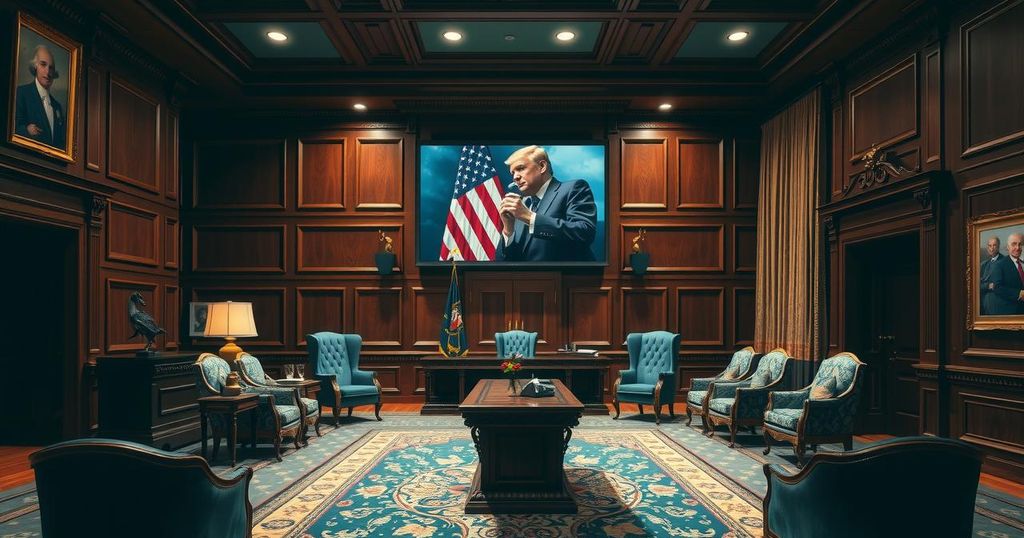Trump and Ramaphosa: A Diplomatic Clash in the Oval Office

In a tense Oval Office meeting, President Trump confronted South African President Cyril Ramaphosa over allegations of ‘white genocide.’ Displaying provocative video clips, Trump’s approach echoed previous confrontations with foreign leaders. Ramaphosa strategically managed the discussion, bringing prominent golfers into the conversation to deflect attention from Trump’s assertions.
In a remarkable encounter in the Oval Office three months into Donald Trump’s second term, South African President Cyril Ramaphosa found himself facing a unique combination of diplomacy and confrontation. It appears that visits to the Oval Office under Trump’s administration may come with the risk of public embarrassment, as evidenced by the latest episode. The meeting unfolded in front of television cameras and involved dimmed lights, a lengthy video, and a series of media clippings.
The conversation started off fairly civil, but took a sharp turn when a reporter posed a question to Trump regarding discredited allegations concerning “white genocide” in South Africa. Ramaphosa responded by urging Trump to consider the perspectives of South Africans. Then, in an abrupt shift, Trump instructed an assistant to dim the lights and cue up a video that he believed would bolster his claims about the supposed persecution of white South Africans.
Elon Musk, a South Africa-born billionaire and advisor to Trump, remained silent throughout the proceedings, sitting behind a couch as the situation unfolded. What came next was a carefully orchestrated outburst from Trump, reminiscent of his earlier aggressive stance towards Ukrainian President Volodymyr Zelensky during a visit. The footage displayed on the screen featured South African politicians chanting inflammatory slogans, setting the stage for a fierce denunciation.
Trump’s assertions hinged on the belief that these political figures—who are not part of the official government—could forcibly take land from white farmers. However, such claims misrepresent reality, as Ramaphosa had previously signed a controversial bill allowing for land expropriation without compensation, yet it has yet to be put into practice. Confounding the matter, Ramaphosa distanced himself from the rhetoric exposed in Trump’s selected video.
Ramaphosa’s strategy included a notable attempt at charm, introducing two renowned South African golfers, Ernie Els and Retief Goosen, into the mix during discussions centered on trade and diplomatic challenges. While Trump is known for his love of golf, the move seemed rather unorthodox for discussions of such weighty international issues. Still, it was clear that Trump’s delight at having the golfers present was visible, even as they dominated the conversation along with Ramaphosa’s agriculture minister from an opposition party.
As the meeting progressed, Trump repeatedly raised concerns about the status of white farmers in South Africa, referencing his previous welcome of numerous individuals from that demographic as refugees. Ramaphosa, however, remained composed and largely unresponsive to the provocations. At one point, he made a pointed remark indicating that had there truly been a genocide, the golfers present would not be there, thus deflecting the allegations with shrewdness.
Despite his efforts, Trump may not have succeeded in eliciting a strong reaction from Ramaphosa, but the extended dialogue served a larger purpose. This episode of performative diplomacy appears designed to resonate with Trump’s domestic audience, reinforcing narratives of grievance that are central to his Make America Great Again movement. Given the growing skill of foreign leaders in navigating these confrontations, it may be time for Trump to reassess his approach moving forward.
In summary, the meeting between President Trump and President Ramaphosa was marked by a blend of diplomacy and confrontation. While Trump attempted to showcase claims of persecution against white South Africans through video evidence, Ramaphosa maintained his composure and deflected these assertions strategically. The presence of the South African golfers served as an interesting element in this encounter, highlighting the complexities of international relations under Trump’s style of presidency. Ultimately, such episodes serve to engage the domestic audience while putting foreign leaders to the test.
Original Source: www.bbc.com




